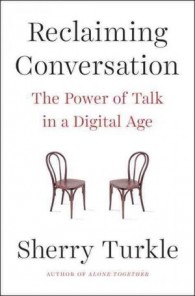Making a case for face-to-face conversation in an age of digital connection…

It may be the techies themselves who give us some of our better advice in the debate about the use of communications technology. Kevin Kelly, senior maverick for Wired magazine, has written that smartphones are the new “sugar and fat.” “They are so potent that they can undo us if we don’t limit them.”
At Tech Insider, ideas editor Drake Baer, has come to a similar realization. He has made a pledge “to turn his iPhone off way more often.” His discovery—solitude is important, and very!
That human beings need solitude in order to “integrate their recent experiences into their larger formation of self” is a lesson Baer learned from MIT professor Sherry Turkle. From her research Dr. Turkle has concluded that “We literally turn being alone into a problem that we want technology to solve.”
Sherry Turkle is not a techie like Kelly and Baer, but she is an insider. Her career at the Massachusetts Institute of Technology has been devoted to studying the human impact of various computer technologies. Thirty years of research has led her to much more circumscribed, less positive, views than those she held on arrival at MIT.
Sherry Turkle is not anti-technology. Rather, she is pro-conversation.
This new mediate life has gotten us into trouble. Face-to-face conversation is the most human – and humanizing – thing we do. Fully present to one another, we learn to listen. It’s where we develop the capacity for empathy. It’s where we experience the joy of being heard, of being understood. …
[H]uman relationships are rich, messy, and demanding. When we clean them up with technology, we move from conversation to the efficiencies of mere connection. …
These are a few of the key insights provided by Dr. Turkle’s new book, Reclaiming Conversation: The Power of Talk in a Digital Age. Some highlights from an interview with NPR illustrate why this book is important for all of us who would use these ubiquitous devices wisely. All sorts of “new technologies — not just iPhones — are changing our conversations.”
On kids talking via their phones rather than face to face
I was called to consult at a middle school because the directors and the teachers were concerned about what they felt was a lack of empathy among middle school children which they associated to the presence of technology. The association they made was when they sit together at lunch they don’t talk to each other — they talk with their phones. Face to face conversation is the most human and humanizing thing that we do; it’s where we learn to put ourselves in the place of the other.
On technology making us scared of solitude
If you’re constantly stimulated by being called away to the buzzing and the excitement of what’s on your phone, solitude seems kind of scary. There’s a study that shows that if you take phones and a book or some kind of reading material away from people, after six minutes they’re willing to give themselves electroshocks rather than be alone without a device. If you don’t have solitude, that means you come to conversations with other people needing them to sort of buttress you and your fragile sense of self. You’re not really able to hear who they are and what they have to say. So you become less of a friend. If you don’t teach your children how to be alone, they’ll only know how to be lonely.
On robotic companionship
I was just interviewed for [an] article on Hello Barbie, the robot best friend for kids. Hello Barbie is just one of the new sociable robots that are designed to pretend to have empathy to care about you and to present themselves as your new best friend. And we have these robots for children and we have them for the elderly.
On seeing robotic companionship in action in a nursing home
There’s a woman whose son has died and she wants to tell her story, and she’s given one of these pretend friend robots and she starts to tell her story to this robot. And the robot knows how to do things that will make her feel as though it understands. And everybody around is like … happy, and to me it was one of the saddest moments because the question was not whether this woman would talk. The question was: Was there anyone listening? And there was no one listening.
On new technology testing our priorities
Every technology causes us to reflect on our human values. The notion that there are not enough people for the jobs of taking care of our elderly is what needs to be revisited here. If we have come to the point where we’re going to give them fake relationships. … You can’t just let this moment pass. We need to look at our social priorities if we seriously want to say: Well, [we have] no time to talk to our children. Let’s just let a robot chat to them about what it means to be a friend. You’re going to get children who don’t know how to be a friend.
Sources and resources:
Sherry Turkle’s Reclaiming Conversation: The Power of Talk in a Digital Age may be purchased here.
“Making the Case For Face To Face in an Era of Digital Conversation,” a seven-minute interview with NPR’s Scott Simon, is available here, along with the highlights excerpted above.
“After talking with a MIT researcher I’m definitely going to stop pulling my phone out all the time” by Drake Baer is online.
“The Flight From Conversation” is an edited transcript of an interview with Sherry Turkle that Lauren Cassani Davis did for The Atlantic.


 December 1, 2015
December 1, 2015 







Comments are closed.